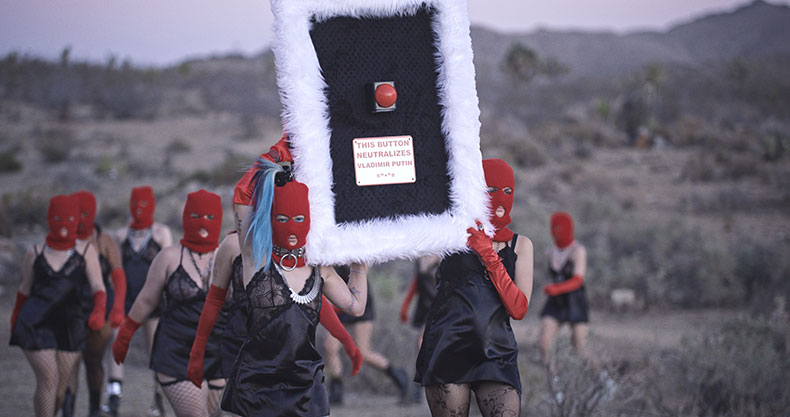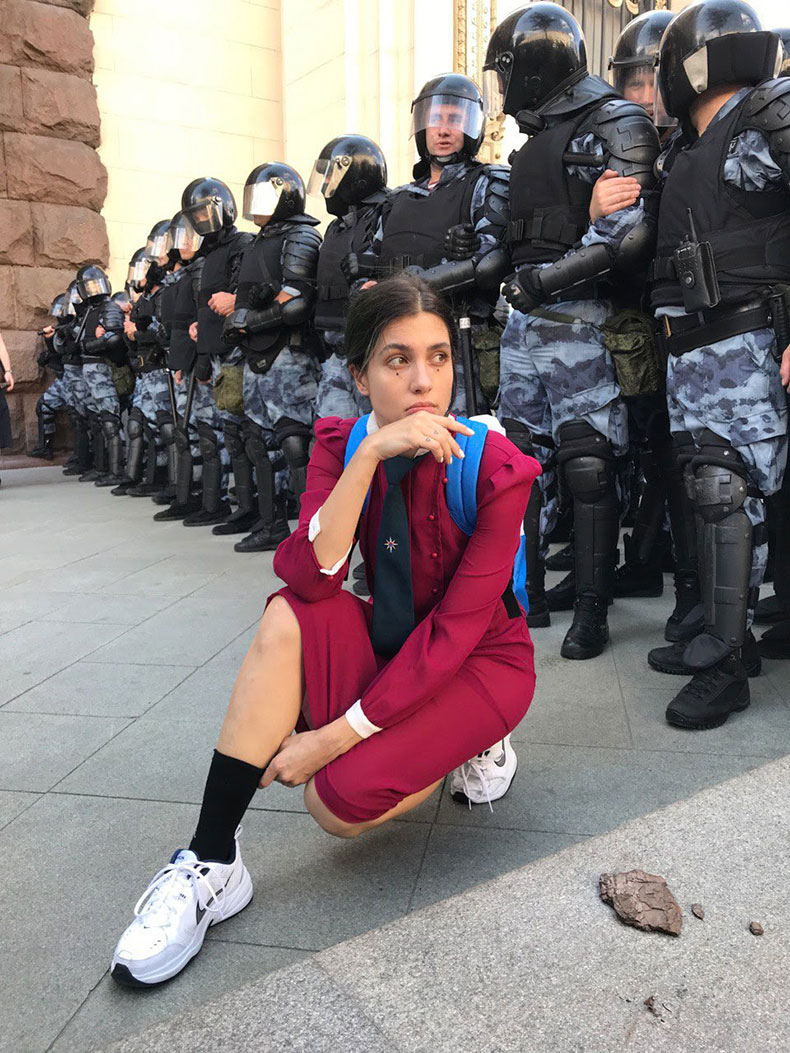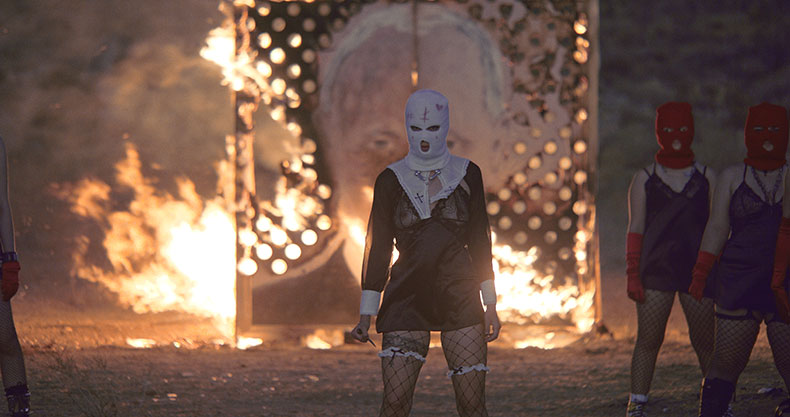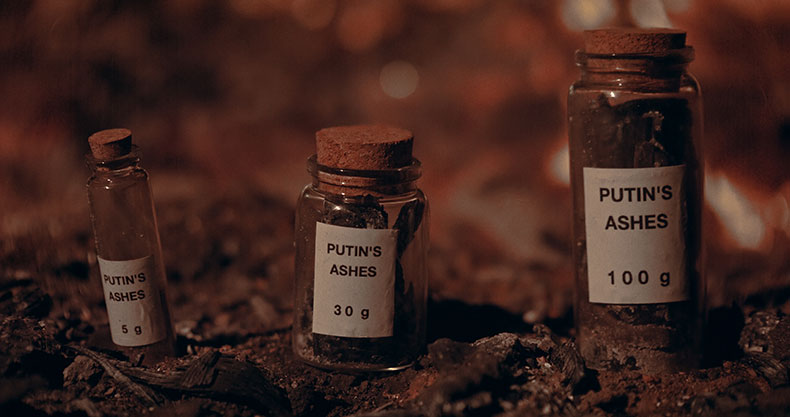In August 2022, a group of 12 women wearing black silk negligees, ripped fish-net tights and red balaclavas cast spells and set a three-by-three metre portrait of Vladimir Putin on fire. The feminist protest-art collective Pussy Riot has tried various methods of purging the Russian president over the last decade. Punk Prayer (2012), a performance protesting against the banning of gay pride and the Orthodox Church’s support of the president, involved the group playing a rock song inside the Cathedral of Christ the Saviour in Moscow and pleading with the Virgin Mary to banish Putin as they punched their fists in the air. The act resulted in two of its members, Nadya Tolokonnikova and Maria Alyokhina, being arrested and sentenced to two years in a Siberian labour camp. Putin’s Ashes, however, was the first time they have called on the powers of witchcraft. As Tolokonnikova tells me, ‘the stakes have never been higher.’

Putin’s Ashes (2022), Nadya Tolokonnikova. Courtesy the artist and Jeffrey Deitch, Los Angeles.
Tolokonnikova is a strong believer in what she calls ‘magic activist thinking’. ‘When people come together for the same cause, they have this powerful intentionality and are able to create something bigger than themselves,’ she says. ‘This is the feeling I’ve been chasing my whole life, going to protests and rallies and staging performances.’
Pussy Riot, of which Tolokonnikova is a founding member, is a non-hierarchical collective. In theory, this means that anyone can participate in their actions or use their name, but there was a mandatory requirement for the participants of Putin’s Ashes: they all had to agree that Putin ‘is the most dangerous living dictator who has to be neutralised’. According to Tolokonnikova, the combined hatred of the group was necessary for building up ‘momentum’. While the ritual hasn’t yet had the desired effect, 12 hours after it took place it was reported that the Crimean bridge, which connects Russia to the annexed region, had been blown up. ‘It would be absurd to make a direct link,’ Tolokonnikova admits, ‘but I think there is something magical about how these two events occurred so close in time.’

Nadya Tolokonnikova. Photo: Santiago Imkorpo Pagnotta
Tolokonnikova grew up in Norilsk, one of the northernmost cities in the world. As we speak over Zoom, she receives a text from her mum who still lives there to say they’ve issued a warning due to strong winds and temperatures below –50°C. It was in this extreme environment that, at the age of 13 or 14, Tolokonnikova staged her first protest – against her school, for praising the Russian Revolution of 1917 and the socialist reforms that followed while ignoring the Soviet regime’s political repression. ‘A lot of the actions I did [back then] were really naive and childish, but I was still trying to do something and that was important,’ she says. After she moved to Moscow at the age of 16, her efforts became both more nuanced and more dangerous. In 2007, she co-founded an art group called Voina, which became known for its provocative and politically charged works of performance art that included forcibly kissing police women on the streets of Moscow. Then, in 2011, Pussy Riot was born. The group staged numerous guerrilla art actions around Moscow that often resulted in brutal beatings by the police and arrests, but gained international recognition only after Tolokonnikova’s imprisonment – Madonna and Hilary Clinton were among the many public figures who spoke out in their defence.
Tolokonnikova attributes much of the support they received during that time and since to the the group’s image. Pussy Riot’s typical rebel ‘uniform’ comprises short dresses and brightly coloured balaclavas. On Zoom, after Tolokonnikova appears briefly to say hello in person, I find myself speaking to an avatar of a masked cyclops woman with voluptuous lips and impressive cleavage, holding a lighter in one hand and a bottle bomb in the other. ‘It was important for us to juxtapose elements that would stand for militants and rioters but at the same time signify a classical femininity – and it works […] What strong art language can do is help to translate what you’re doing – your political position – into different contexts so that people can relate,’ she explains. ‘We considered wearing black masks but decided that if we turned up in a public place in black masks, people would just be scared.’

Tolokonnikova (in white mask) performing Putin’s Ashes. Courtesy the artist and Jeffrey Deitch, Los Angeles.
On the opening night of the group’s first solo exhibition at Jeffrey Deitch Gallery in Los Angeles (27 January–3 February) all visitors are required to wear balaclavas. It’s a symbol of solidarity – as Tolokonnikova puts it, ‘anyone can be Pussy Riot’. But it’s also an attempt to overcome the problem of presenting art that’s meant to provoke in a gallery or museum setting. The masks are a costume, an invitation to experience the thrill and threat of taking part. The show will also include the bottled ashes of the burnt portrait of Putin, a short film and an NFT artwork created in collaboration with the American artist Shepard Fairey, with all proceeds going to Ukrainian frontline troops.
Since Tolokonnikova was declared a ‘foreign agent’ by the Kremlin in December 2021, the crypto world has become an important platform for Pussy Riot’s activism. ‘First of all, it makes fundraising much easier because you do not depend on any government or corporation and secondly, it builds community. A lot of NFT projects are decentralised and it has been interesting for me as an activist to see how a community can govern itself within that space,’ she says. In March 2022, the group was instrumental in raising $6.8m for Ukraine through the sale of an NFT of the Ukrainian flag on UkraineDAO, a community-led crypto platform co-founded by Tolokonnikova and UnicornDAO, an investment fund that collects digital artworks made by female, LGBTQ+ and non-binary creators in an attempt to address the gender imbalance on the crypto scene.

Putin’s Ashes (2022), Nadya Tolokonnikova. Courtesy Courtesy the artist and Jeffrey Deitch, Los Angeles.
Does it ever feel like too much? ‘Always. Activist burnout is a very, very real thing,’ Tolokonnikova says. ‘As an activist, you’re very vulnerable to all the bad that happens in the world – you keep yourself open to it. I try to bury that trauma in an insane amount of work and my brain gets exhausted. It’s my community who helps me to remember that it is important to take care of myself. At the end of the day you’re going to be more effective in helping the world if you feel good.’
‘Pussy Riot: Putin’s Ashes’ is at Jeffrey Deitch Gallery in Los Angeles until 3 February.














![Masterpiece [Re]discovery 2022. Photo: Ben Fisher Photography, courtesy of Masterpiece London](http://zephr.apollo-magazine.com/wp-content/uploads/2022/07/MPL2022_4263.jpg)
‘Like landscape, his objects seem to breathe’: Gordon Baldwin (1932–2025)